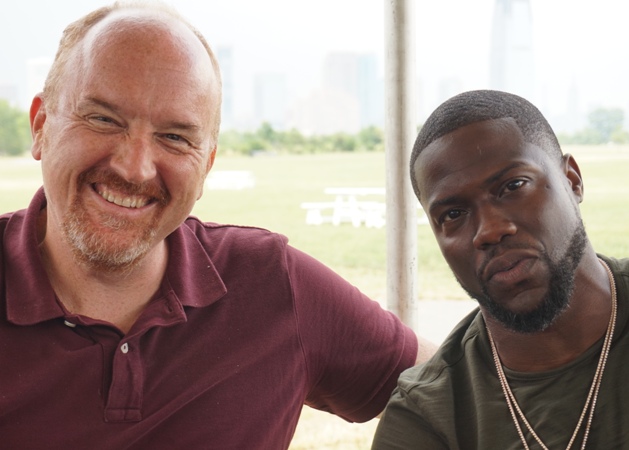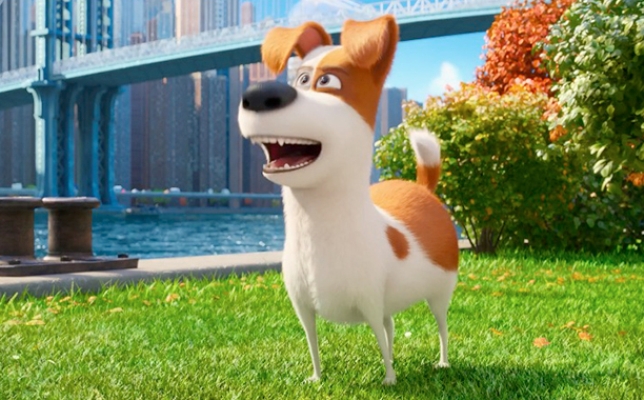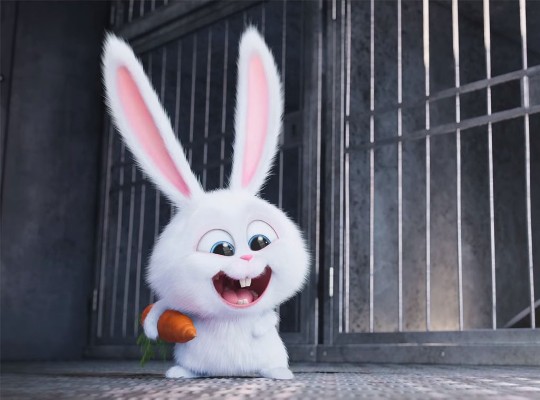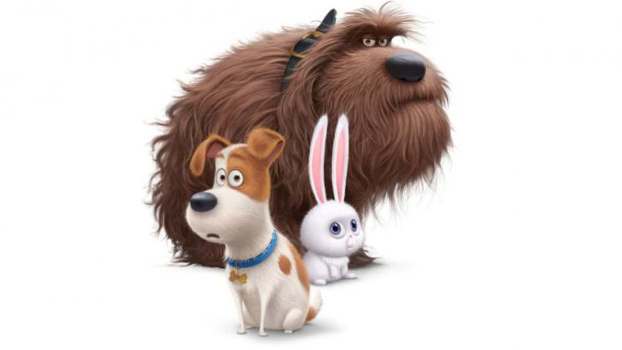Comedians Louis CK and Kevin Hart make for
formidable presences, especially through their voices – which really
makes the animated feature The Secret Life of Pets a rollicking
comedy and the raucous
charmer of the past summer. Now it is getting its video release.
After all, a talking terrier and animated bunny
can corral even the hardest of hearts, especially when the bunny is
leading an underground revolutionary force while the Jack Russell is
busting his buddy out of the animal jail (that is, the animal control
mobile pound). Individually, CK or Hart would be enough to propel this
production, but together they really drive the story forward.
Max, the Jack Russell (CK), is fun-loving but
possessive of his owner – and always a little frantic and anxious until
she comes home each day. But when big Labrador Duke (Eric Stonestreet)
is brought home, Max's sedate world is shaken up. His idyllic life is
shared with the other pets who live in or near his Manhattan building,
among them, the rolly-polly kitty Chloe (Lake Bell), the hyperactive pug
Mel (Bobby Moynihan), floppy daschund Buddy (Hannibal Buress), and
parakeet Sweet Pea (Tara Strong).
Unfortunately, thanks to an errant dog walker
and a rambunctious blowout between the two, Max and Duke land among a
gang of abandoned pets led by Snowball (Hart), the seemingly villainous
white rabbit – driven mad when his magician master abandoned him. When
he went crazy, he formed an underground army bent on revenge against
humankind from a pack of other abandonees. Mayhem ensues until, finally,
they all find each other, their owners and the comforts of home – or at
least, a secure sewer system.
Produced by Chris Meledandri and
directed by Chris
Renaud with Yarrow Cheney, this digital extravaganza poses a worthy
challenge to their Despicable Me films (and its spin-off,
Minions) for being this trio's most wacked-out comedy.
Besides helming this animated feature, both
comics have been on a roll lately.
 For
the Philly-born Hart, his performance in Central Intelligence
with Dwayne Johnson is only the latest of many cinematic successes in
which he's been paired with perfect foils. Witness the string of box
office hits he's had since 2012 – Get Hard, About Last Night, Ride
Along, Grudge Match, and Think Like a Man. The 36-year-old's
forays into New England's stand-up comedy clubs scene years before honed
his quick wit and manic behavior so he could attain such heights –
including being named sixth on the richest celebrity list.
For
the Philly-born Hart, his performance in Central Intelligence
with Dwayne Johnson is only the latest of many cinematic successes in
which he's been paired with perfect foils. Witness the string of box
office hits he's had since 2012 – Get Hard, About Last Night, Ride
Along, Grudge Match, and Think Like a Man. The 36-year-old's
forays into New England's stand-up comedy clubs scene years before honed
his quick wit and manic behavior so he could attain such heights –
including being named sixth on the richest celebrity list.
On the other hand, Louis Székely (aka CK) has
made his mark on the humor scene in a more traditional fashion – first
as a writer for comedians David Letterman, Conan O'Brien, and Chris Rock
and then, by leaping into directing, first surreal shorts and then two
un-noticed features – 2001's Pootie Tang and 1998's Tomorrow
Night. But a move to TV, first by starring in the short-lived HBO
sitcom Lucky Louie, led to his acclaimed 2010
semi-autobiographical dramedy on FX which he created, starred in, wrote,
directed, produced and edited. Most recently, CK has created and starred
in a self-produced web series Horace and Pete that he even
distributes himself to great success.
During an exclusive press conference at New
Jersey's Liberty State Park – among the woods and animals – the two
held court on the virtues of their animal selves. With his manic energy
bursting out, Hart animated (so to speak) the conversation while CK
offered more tempered but equally insightful comments.
What was
your reaction when you got the role, especially a character with two
sides?
Kevin
Hart:
A very good question. That was a double banger. You know, I was excited.
This is my first animation film. Nothing gets you more excited than
seeing your character, since your character has two sides. They showed
me a picture of the bunny when he was very nice and adorable, and then
they flipped the page and he was grabbing his ears and stuff, and his
eyes were angry. They said, "Kevin, we want you to bring your
personality to this bunny. Give us the cute, cuddly side, but at the
same time make it believable that this guy can start a revolution and
have people follow him." I jumped at the opportunity.
 Louis,
how did you get in the head of the dog? How did you see the world? How
did you provide the input from a dog's perspective?
Louis,
how did you get in the head of the dog? How did you see the world? How
did you provide the input from a dog's perspective?
Louis CK:
This movie always made sense to me, that's why I decided to do it. A dog
living in New York City – I live in New York. You have this tension
between your little home, everybody's home in New York is small and
intimate, and the giant city, the chaos of the city. I always understood
Max. Also, dogs are very transparent. They're easy to read. I get dogs.
Every time we'd be doing a scene and the dog is desperate for the woman
to come home, I get it. I totally get it. In a way, when you play
another species you can more easily get rid of parts of yourself. Dogs
don't have a timeline in their heads, they don't have any confidence in
the future. They just believe that whatever they're feeling is what
they'll always feel. I try to remember that.
One of
the things that's great about this film and its characters –
particularly your two – is that, on the one hand, they seem confident,
at the same time, there's a certain inner neediness that you guys are
successful in expressing. Which is something you also express in your
other work. How do you tap into that inner neediness?
Louis CK:
These are domestic creatures, too, so they're really dependent on
people. They really need someone to feel ok. You can give a dog all his
treats and toys and a bag of food, and he's not happy unless you're
there. You take a dog out of that, and he's going to be very upset.
That's easy to relate to, I think. Even with each other, the [concept]
in this movie is that they go and try to form their own sense of family.
[Kevin]'s a rejected animal, who's been flushed down the toilet.
Kevin
Hart:
Well... He wasn't flushed down; he was just left behind...
Louis CK:
I think the rabbit is pretty literally flushed down the toilet.
Kevin
Hart:
I mean, we all end up in the sewer but he wasn't technically flushed.
Louis CK:
I totally thought that he was flushed down the toilet.
 Kevin
Hart:
The thing about my character is that he's very insecure. If you guys
don't pick up anything else from Snowball setting the tone and being a
leader, [is that] there's also a strong sense of doubt in everything he
does. With every order that he gives, there's a question behind it of,
"Was that too much? Do you guys get why I said that? You guys heard
[me]? Everybody's following me, you guys get why? Raise your hands. All
right, never mind, put it down, maybe that's too much." It's always a
lot. That's one of the main things that the director [Renaud] talked
about. You wanted to ground the guy. If he just has one note, that one
note isn't that good. It's not fun to track. But being that he's all
over the place and kind of a mess, when he comes full circle you get why
he comes full circle. Ultimately, he wants the same thing that Max and
Duke want, which is love. They want that attention, the security that
comes with having an owner. [Snowball] don't have that, which is what
put me in the room that I'm in. But I wasn't flushed down the toilet.
Kevin
Hart:
The thing about my character is that he's very insecure. If you guys
don't pick up anything else from Snowball setting the tone and being a
leader, [is that] there's also a strong sense of doubt in everything he
does. With every order that he gives, there's a question behind it of,
"Was that too much? Do you guys get why I said that? You guys heard
[me]? Everybody's following me, you guys get why? Raise your hands. All
right, never mind, put it down, maybe that's too much." It's always a
lot. That's one of the main things that the director [Renaud] talked
about. You wanted to ground the guy. If he just has one note, that one
note isn't that good. It's not fun to track. But being that he's all
over the place and kind of a mess, when he comes full circle you get why
he comes full circle. Ultimately, he wants the same thing that Max and
Duke want, which is love. They want that attention, the security that
comes with having an owner. [Snowball] don't have that, which is what
put me in the room that I'm in. But I wasn't flushed down the toilet.
As
performing artists and fathers yourselves, what's the worst and best
thing about being an artist and a parent as well? Has it changed over
the years since you're so successful now?
Kevin
Hart:
I think the one amazing thing about being an artist or an entertainer is
providing for your family. As a man, you want to be able to give the
security to your woman and to your kids, and build a foundation. That's
the plus. But the gift is a curse. The curse is that we have to work:
we're traveling people. Our job doesn't keep us stable. We're gone [a
lot], and sometimes being gone is tough [especially] when you're close
to your kids, as Louis and myself [are]. I think it's a balance that you
have to find, and when you find it you run like a well-tuned
engine. There are no bumps along the road, because your kids now have an
understanding of what their father does and why he does it at the
capacity that he does it at. An understanding comes along the way. As a
father, you have to make sure that your kids understand that, you have
to make sure that you're instilling those positive images in their head
of what Daddy does, and why he's doing what he's doing.
Louis CK:
I have sort of the reverse. I mean Kevin's 36, he's a young dad. I'm 48,
and my daughter is 14. I find that I can spend more time with my kids,
because I have a little more control. If you work in a factory, you
can't go to the factory boss like, "I want to go with my kids to the
park or something." You know, fuck you, go to work. So I have a little
more control over my life in that sense. Also, it's a nice model for
your kids that you can do something you love and make a living off of
it. It's not realistic, that's why I get worried sometimes. I always
tell my kids, "This isn't normal. You may have to do something that's
not your favorite thing, and still make a living." I think the most
important thing you can give your kids is an education on how to take
care of yourself. It's a challenge actually, as this show business dad,
to model normal taking-care-of-yourself behavior, even though what
you're really doing is making stupid movies and standing on your head
and making people laugh, and getting a disproportionate amount of money
compared to your actual contribution.
 How
does it feel different to make an animated project for kids and families
now, what does that feel like?
How
does it feel different to make an animated project for kids and families
now, what does that feel like?
Louis CK:
It's nice to make something your kids can watch, that's a nice thing. My
kids can't see anything I make, except for this.
Kevin
Hart:
I'm the opposite.
Louis CK:
However long this movie is, it's the only thing they can watch.
Kevin
Hart:
I let my kids watch everything I do. "You go to school and you recite
Daddy's lines to your friends." No, no, I'm joking. It is good. You want
to have material that your kids can watch, can watch with you and laugh.
I guess they can say, "That's my dad." The other things that I do, I
can't let them watch them at this age. There's some things that they've
watched — just because you're their dad — you want to be able to say
they saw it with you. But for the most part, animation is the right way
to go and I'm glad that I was able to squeeze one in before they get too
old.
In a
recent article a writer wrote that Hollywood is hiding the biggest black
actors behind animation and a lot of makeup. Do you feel that Hollywood
is really doing that, or that all opportunities are great?
Kevin
Hart:
I think people will look for any excuse to play the race card in
Hollywood. In this day and age, it is what it is. You want it to be more
diversified, you want to see more diversity, but a lot of people draw
attention to it by talking about it. If you just work and progress, you
eventually put yourself into a position where you can help the problem
by bringing more people into the business. When you draw negative
attention, you're only going to get a negative response. I don't believe
in adding to it. I bust my ass and do what I'm supposed to. I've been
promoting movies internationally now for the last four years. They said
movies don't transfer to black actors internationally. I don't feed into
that. I do what I do. If other people did the same, you'd look up and
see more multicultural films being received by so many more people. I
would just say, instead of looking for a reason to say, "Look at that,"
look at the people who are in those positions and applaud them. Applaud
those actors that are in those animated movies, regardless of color of
skin. They're working, and creating opportunities for others.
Email us Let us know what you think.